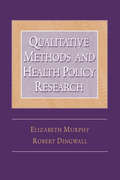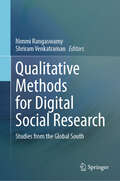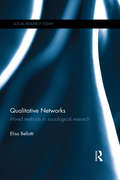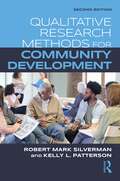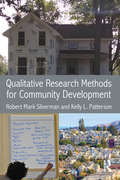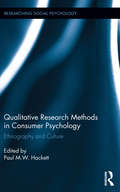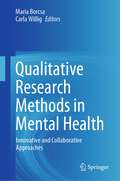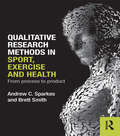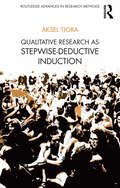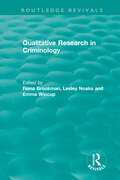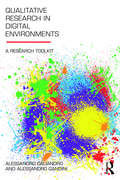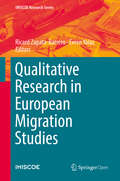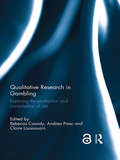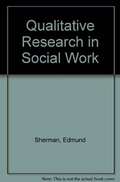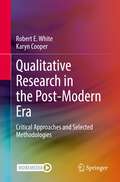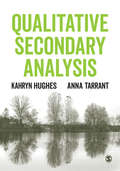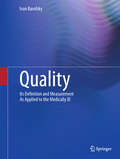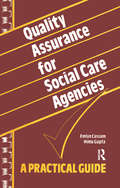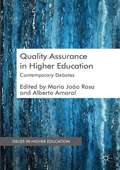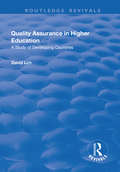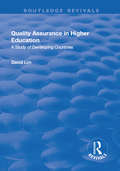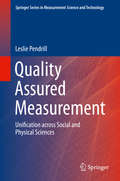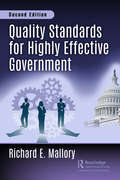- Table View
- List View
Qualitative Methods and Health Policy Research (Social Problems And Social Issues Ser.)
by Elizabeth MurphyQualitative researchers have traditionally been cautious about claiming that their work was scientific. The "right-on" schools have exaggerated this caution into an outright rejection of science as a model for their work. Science is, for them, outmoded; "an archaic form of consciousness surviving for a while yet in a degraded form" (Tyler 1986:200). Scientists' assertions that they are in pursuit of truth simply camouflage their own lust for power. There is no essential difference between truth and propaganda.The authors acknowledge that the boundary between science and propaganda has often been breached and some distrust of scientific claims may be healthy. They also question the claim that science creates disinterested and objective knowledge of an observer-independent world without concluding that science is impossible. The skeptics' reservations about qualitative research are based on the deep-rooted assumption among natural scientists, and some social scientists, that there is a world "out there," prior to, and independent of, their observations. This world can be known objectively in the sense that all observers will, if identically placed, see it in exactly the same way. If a suitable language were available, they would also all produce identical descriptions. From these observations they can work out the laws governing the world's operations. The authors try to resolve these contrary claims by asserting that science is a procedural commitment. It consists of openness to refutation, a conscientious and systematic search for contradictory evidence, and a readiness to subject one's preconceptions to critical examination. The devotion to truth as a regulative ideal is an essential difference between science and propaganda. This work is a unique and innovative defense of scientific method.
Qualitative Methods for Digital Social Research: Studies from the Global South
by Nimmi Rangaswamy Shriram VenkatramanThis volume offers a series of practical methods to study digital behaviours considering the socio-cultural realities of the global south. It includes methodologically rigorous applied research chapters from leading international researchers offering information on gold mines and blind spots in researching the digital in the global south. It develops a tri-sectional format based on distinct areas of research, geographical variability and diversity of methods and approaches. The first section focuses on Dissecting Research Fractures – which disrupts the established research ideologies and practices, user behaviors, theoretical perspectives, and field methods in the study of digital social research . The second section on Innovating Methods proposes and extends mixed methodologies that go beyond research boundaries to produce novel possibilities for study. The final section on Re-Imagining the Field breaks new ground in exploring the social-digital where a transient research field is contextualized and stabilized through the social, infrastructural, and digital interweaving. The book offers the reader an inside view of studying marginal yet emerging users and consumers of digital technologies. The three sections together purport to draw textual, graphical, temporal, and ethnographic insights via innovative and hybrid observational tools to record, annotate and formulate everyday experiences of digital life. The volume addresses scholars interested in hybridizing methods, early career researchers, and graduates working on connecting humans and digital technologies. It also holds considerable appeal for digital marketers and strategists, offering practically applicable methods to study digital life.
Qualitative Networks: Mixed methods in sociological research (Social Research Today)
by Elisa BellottiHow do we interact with people in our everyday life? Who are the people we are connected to? What are the consequences of overlapping social circles and how people deal with the potential emerging conflicts? What are the structural and cultural mechanisms that regulate social worlds? Network science is a scientific approach to the study of network dependencies and associations which tries to answer these and many other questions. This book explores the underlying mechanisms that regulate social life as they are produced, reproduced, modified, and abandoned in the spatial and temporal patterns of interactions. The mixed methods approach, that combines formal network analysis with qualitative materials and statistical tools, shows the importance of contextualising structural mechanisms in their social and cultural environment, and allows overcoming the traditional methodological boundaries that shape the field of social sciences.
Qualitative Research Methods for Community Development
by Robert Mark Silverman Kelly L. PattersonThe second edition of Qualitative Research Methods for Community Development teaches the basic skills, tools, and methods of qualitative research with special attention to the needs of community practitioners. This book teaches students entering planning, community development, nonprofit management, social work, and similar applied fields the core skills necessary to conduct systematic research designed to empower communities and promote social change. Focusing on the basic elements of qualitative research, such as field observation, interviewing, focus groups, and content analysis, this second edition of this book provides an overview of core methods and theoretical underpinnings of successful research. It also includes two new chapters on qualitative data analysis software and techniques for conducting online qualitative interviews and focus groups. From housing, community organizing, neighborhood planning, and urban revitalization, this book gives students the skills they need to undertake their own projects and provides professionals a valuable reference for their future research. This book serves as a primary text for courses in applied qualitative research and as a reference book for professionals and community-based researchers.
Qualitative Research Methods for Community Development
by Robert Mark Silverman Kelly L. PattersonQualitative Research Methods for Community Development teaches the basic skills, tools, and methods of qualitative research with special attention to the needs of community practitioners. This book teaches students entering planning, community development, nonprofit management, social work, and similar applied fields the core skills necessary to conduct systematic research designed to empower communities and promote social change. Focusing on the basic elements of qualitative research, like field observation, interviewing, focus groups, and content analysis, Qualitative Research Methods for Community Development provides an overview of core methods and theoretical underpinnings of successful research. The book provides examples from past research used in transformative community projects across multiple disciplines. From housing, community organizing, neighborhood planning, and urban revitalization, this book gives students the skills they need to undertake their own projects, and provides professionals a valuable reference for their future research. The book serves as a primary text for courses in applied qualitative research, and as a reference book for professionals and community-based researchers. In addition to content detailing core methods used in qualitative research, it includes a chapter which provides guidance for the dissemination of qualitative results to a spectrum of audiences applying qualitative methods to action research and community empowerment.
Qualitative Research Methods for Community Development
by Robert Mark Silverman Kelly PattersonThe second edition of Qualitative Research Methods for Community Development teaches the basic skills, tools, and methods of qualitative research with special attention to the needs of community practitioners. This book teaches students entering planning, community development, nonprofit management, social work, and similar applied fields the core skills necessary to conduct systematic research designed to empower communities and promote social change.Focusing on the basic elements of qualitative research, such as field observation, interviewing, focus groups, and content analysis, this second edition of this book provides an overview of core methods and theoretical underpinnings of successful research. It also includes two new chapters on qualitative data analysis software and techniques for conducting online qualitative interviews and focus groups.From housing, community organizing, neighborhood planning, and urban revitalization, this book gives students the skills they need to undertake their own projects and provides professionals a valuable reference for their future research. This book serves as a primary text for courses in applied qualitative research and as a reference book for professionals and community-based researchers.
Qualitative Research Methods in Consumer Psychology: Ethnography and Culture
by Paul HackettWhile consumer research is founded on traditional quantitative approaches, the insight produced through qualitative research methods within consumer settings has not gone unnoticed. The culturally situated consumer, who is in intimate dialogue with their physical, virtual and social surroundings, has become integral to understanding the psychology behind consumer choices. This volume presents readers with theoretical and applied approaches to using qualitative research methods in ethnographic studies looking at consumer behavior. It brings together an international group of leading scholars in the field of consumer research, with educational and professional backgrounds in marketing, advertising, business, education, therapy and health. Researchers, teaching faculty, and students in the field of consumer and social psychology will benefit from the applied examples of qualitative and ethnographic consumer research this volume presents.
Qualitative Research Methods in Mental Health: Innovative and Collaborative Approaches
by Maria Borcsa Carla WilligThis book examines innovative approaches to the use of qualitative methods in mental health research. It describes the development and use of methods of data collection and analysis designed. These methods address contemporary and interdisciplinary research questions, such as how to access the voices of vulnerable populations, understand the relationship between experience and discourse, and identify processes and patterns that characterize institutional practices. The book offers insight into projects that reflect various cultural contexts and geographical locations as well as involve diverse research teams, ranging in their methodology from individual case studies to community-based interventions.Chapters address how research method selection needs to be tailored to specific contexts within which studies are carried out and how synthesizing diverse perspectives of different disciplines – such as psychology, sociology, linguistics, history, and art – make a research endeavor more fruitful. The book offers a clear framework in which to assess the research presented in the book as well as map future directions for qualitative methodology in mental health research.Key areas of coverage include projects that describe research with:• Individuals confronted with critical life events.• Former psychiatric patients.• Individual and couple psychotherapy clients.• Clients in a forensic setting.• Persons affected by psychosis.• Dementia patients.• People living with cancer.• Health care professionals. Qualitative Research Methods in Mental Health is a valuable resource for researchers, professors, and graduate students as well as therapists and other professionals in clinical and counseling psychology, psychotherapy, social work, and family therapy as well as all interrelated psychology and medical disciplines.
Qualitative Research Methods in Sport, Exercise and Health: From Process to Product
by Andrew C. Sparkes Brett SmithQualitative forms of inquiry are a dynamic and exciting area within contemporary research in sport, exercise and health. Students and researchers at all levels are now expected to understand qualitative approaches and be able to employ them in their work. In this comprehensive and in-depth introductory text, Andrew C. Sparkes and Brett Smith take the reader on a journey through the entire qualitative research process that begins with the conceptualization of ideas and the planning of a study, moves through the phases of data collection and analysis, and then explains how findings might be represented in various ways to different audiences. Ethical issues are also explored in detail, as well as the ways that the goodness of qualitative research might be judged by its consumers. The book is based on the view that researchers need to make principled, informed and strategic decisions about what, why, when, and how to use qualitative forms of inquiry. The nature of qualitative research is explained in terms of both its core assumptions and what practitioners actually do in the field when they collect data and subject it to analysis. Each chapter is vividly illustrated with cases and examples from published research, to demonstrate different qualitative approaches in action and their relative strengths and weaknesses. The book also extends the boundaries of qualitative research by exploring innovative contemporary methodologies and novel ways to report research findings. Qualitative Research Methods in Sport, Exercise and Health is essential reading for any student, researcher or professional who wishes to understand this form of inquiry and to engage in a research project within a sport, exercise or health context.
Qualitative Research as Stepwise-Deductive Induction (Routledge Advances in Research Methods)
by Aksel TjoraThis book provides thorough guidance on various forms of data generation and analysis, presenting a model for the research process in which detailed data analysis and generalization through the development of concepts are central. Based on an inductive principle, which begins with raw data and moves towards concepts or theories through incremental deductive feedback loops, the ‘stepwise-deductive induction’ approach advanced by the author focuses on the analysis phase in research. Concentrating on creativity, structuring of analytical work, and collaborative development of generic knowledge, it seeks to enable researchers to extend their insight of a subject area without having personally to study all the data generated throughout a project. A constructive alternative to Grounded Theory, the approach advanced here is centred on qualitative research that aims at developing concepts, models, or theories on basis of a gradual paradigm to reduce complexity. As such, it will appeal to scholars and students across the social sciences with interests in methods and the analysis of qualitative data of various kinds.
Qualitative Research in Criminology (Routledge Revivals)
by Emma Wincup Fiona Brookman Lesley NoaksPublished in 1999, this text brings together detailed reflexive accounts of authors’ experiences of conducting research on a variety of criminological topics. The broad aim of the book is to critically review how qualitative methods can be effectively deployed in the area of criminology. The conclusions reached in the text are diverse, reflecting the range of qualitative methods considered and the particular criminological topics to which they are applied. A common theme throughout is that whilst qualitative research can help to provide valid and meaningful information on criminological issues, researchers need to carefully reflect upon both the methodological and ethical dimensions of their work. The book will appeal to those who wish to understand the experience of conducting qualitative research on aspects of crime and criminal justice. This will include undergraduate and postgraduate students undertaking research for the first time, as well as experienced researchers and teachers. This book was originally published as part of the Cardiff Papers in Qualitative Research series edited by Paul Atkinson, Sara Delamont and Amanda Coffey. The series publishes original sociological research that reflects the tradition of qualitative and ethnographic inquiry developed at Cardiff. The series includes monographs reporting on empirical research, edited collections focussing on particular themes, and texts discussing methodological developments and issues.
Qualitative Research in Digital Environments: A Research Toolkit
by Alessandro Gandini Alessandro CaliandroThis book offers a toolkit of methods and technologies to undertake qualitative research on digital spaces. Unlike commonly used traditional methodological strategies, which are ‘retrofitted’ to digital spaces, Qualitative Research in Digital Environments offers researchers a set of ‘digitally native’ tools that are designed for online social environments. Thanks to a broad range of cases including Louis Vuitton, YouTube and the concept of ‘hipsterism’, this text illustrates the practical applications of techniques and tools over the most popular social media environments. This book will be a valuable guide to qualitative research for marketing students, researchers and practitioners, as well as a central reference point for tutors in the growing field of Digital Sociology.
Qualitative Research in European Migration Studies (IMISCOE Research Series)
by Ricard Zapata-Barrero Evren YalazThis open access book covers the main issues, challenges and techniques concerning the application of qualitative methodologies to the study of migration. It discusses theoretical, epistemological and empirical questions that must be considered before, during, and after undertaking qualitative research in migration studies. It also covers recent innovative developments and addresses the key issues and major challenges that qualitative migration research may face at different stages i.e. crafting the research questions, defining approaches, developing concepts and theoretical frameworks, mapping categories, selecting cases, dealing with concerns of self-reflection, collecting and processing empirical evidence through various techniques, including visual data, dealing with ethical issues, and developing policy-research dialogues. Each chapter discusses relative strengths and limitations of qualitative research. The chapters also identify the main drivers for qualitative research development in migration studies. It is a unique volume as it brings together a multidisciplinary perspective as well as illustrations of different issues derived from the research experience of the recognized authors. One additional value of this book is its geographic focus on Europe. It seeks to explore theoretical and methodological issues that are raised by distinctive features of the European context. This volume will be a useful reference source for scholars and professionals in migration studies and in social sciences as well. The publication is also addressed to graduate and post-graduate students and, more generally, to those who embark on the task of doing qualitative research for the first time in the field of migration.
Qualitative Research in Gambling: Exploring the production and consumption of risk
by Rebecca Cassidy Andrea Pisac Claire LoussouarnThe Open Access version of this book, available at http://www.tandfebooks.com, has been made available under a Creative Commons Attribution-Non Commercial-No Derivatives 3.0 license. Gambling is both a multi-billion-dollar international industry and a ubiquitous social and cultural phenomenon. It is also undergoing significant change, with new products and technologies, regulatory models, changing public attitudes and the sheer scale of the gambling enterprise necessitating innovative and mixed methodologies that are flexible, responsive and ‘agile’. This book seeks to demonstrate that researchers should look beyond the existing disciplinary territory and the dominant paradigm of ‘problem gambling’ in order to follow those changes across territorial, political, technical, regulatory and conceptual boundaries. The book draws on cutting-edge qualitative work in disciplines including geography, organisational studies, sociology, East Asian studies and anthropology to explore the production and consumption of risk, risky places, risk technologies, the gambling industry and connections between gambling and other kinds of speculation such as financial derivatives. In doing so it addresses some of the most important issues in contemporary social science, including: the challenges of studying deterritorialised social phenomena; globalising technologies and local markets; regulation as it operates across local, regional and international scales; and the rise of games, virtual worlds and social media.
Qualitative Research in Social Work
by William J. Reid Edmund ShermanIn this volume, progressive experts survey recent trends in qualitative study, which relies on small sample groups and interview data to better represent the context and complexity of social work practice. Chapters address different approaches to qualitative inquiry, applications to essential areas of research and practice, integration of qualitative and quantitative methods, and epistemological issues. <p><p> This second edition brings even greater depth and relevance to social work qualitative research, including new material that tackles traditional research concerns, such as data quality, ethics, and epistemological stances, and updated techniques in data collection and analysis. To increase the usefulness for students and researchers, the editors have reorganized the text to present basic principles first and then their applications, and they have increased their focus on ethics, values, and theory. New and revised illustrative studies highlight more than ever the connection between effective research and improved social functioning among individuals and groups. The collection continues to feature scholars and practitioners who have shaped the social work research practice canon for more than twenty years, while also adding the innovative work of up-and-coming talent.
Qualitative Research in the Post-Modern Era: Critical Approaches and Selected Methodologies
by Robert E. White Karyn CooperThis volume describes and discusses some of the intricacies associated with qualitative research in this post-modern era. It is the second of a two-volume set. It strives to define terms, identifies paradigms, methodologies and approaches that are applicable to novice and expert researchers alike. The book pays special attention to the biographies of those individuals who have helped to shape and develop these methodologies or research designs. In addition, consideration is given to historical and political underpinnings that relate to the development of qualitative research methodologies. Each research design is described in detail and the similarities and differences among them are explored. This volume makes use of a contextual approach to research and features interviews with scholars who have assisted in developing such methodologies. Of interest are numerous features such as questions for further study and annotated bibliographies that extend the scope of each of the methodologies described.
Qualitative Secondary Analysis
by Kahryn Hughes Anna TarrantA comprehensive guide to carrying out Qualitative Secondary Analysis (QSA) that brings together expert advice and professional insight from leading researchers who have developed innovative theories and methods of QSA. Exploring crucial components of research and analysis—such as where to find resources, how to search within a resource, and working with both paper archives and non-textual data—each chapter offers insightful case studies, links to further reading and applied helpful hints and tips to help effectively apply these innovations to further the reader&’s own research. A must read for Social Science students, early career researchers and researchers new to the field of QSA, this text will help readers through every aspect of a research process using QSA, from application to implications.
Qualitative Secondary Analysis
by Kahryn Hughes Anna TarrantA comprehensive guide to carrying out Qualitative Secondary Analysis (QSA) that brings together expert advice and professional insight from leading researchers who have developed innovative theories and methods of QSA. Exploring crucial components of research and analysis—such as where to find resources, how to search within a resource, and working with both paper archives and non-textual data—each chapter offers insightful case studies, links to further reading and applied helpful hints and tips to help effectively apply these innovations to further the reader’s own research. A must read for Social Science students, early career researchers and researchers new to the field of QSA, this text will help readers through every aspect of a research process using QSA, from application to implications.
Quality
by Ivan BarofskyQuality, as exemplified by Quality-of-life (QoL) assessment, is frequently discussed among health care professionals and often invoked as a goal for improvement, but somehow rarely defined, even as it is regularly assessed. It is understood that some medical patients have a better QoL than others, but should the QoL achieved be compared to an ideal state, or is it too personal and subjective to gauge? Can a better understanding of the concept help health care systems deliver services more effectively? Is QoL worth measuring at all? Integrating concepts from psychology, philosophy, neurocognition, and linguistics, this book attempts to answer these complex questions. It also breaks down the cognitive-linguistic components that comprise the judgment of quality, including description, evaluation, and valuations, and applies them to issues specific to individuals with chronic medical illness. In this context, quality/QoL assessment becomes an essential contributor to ethical practice, a critical step towards improving the nature of social interactions. The author considers linear, non-linear, and complexity-based models in analyzing key methodology and content issues in health-related QoL assessment. This book is certain to stimulate debate in the research and scientific communities. Its forward-looking perspective takes great strides toward promoting a common cognitive-linguistic model of how the judgment of quality occurs, thereby contributing important conceptual and empirical tools to its varied applications, including QoL assessment.
Quality Assurance for Social Care Agencies: A Practical Guide
by Emlyn Cassam Himu GuptaQuality Assurance for Social Care Agencies is specifically designed to enable you to set up a Quality Assurance system within a social services setting. Including practical checklists, it covers all aspects of Quality Assurance - from what is meant by Quality Assurance and how to implement it to how to monitor and maintain quality control. Examples and details of experiences are included to help you get it right first time.
Quality Assurance in Higher Education
by Alberto Amaral Maria João RosaThis book weighs up the consequences of introducing Quality Enhancement and Risk Management as new dimensions in Higher Education quality control on a global scale. The authors include Chief Executive Officers of Quality Agencies, policy analysts and leading scholars in Quality Evaluation and Comparative Higher Education policy analysis.
Quality Assurance in Higher Education: A Study of Developing Countries (Routledge Revivals Ser.)
by David LimThis title was first published in 2001. Universities in developing countries have followed their counterparts in developed countries and adopted quality assurance to improve the quality of their activities. This text examines the wisdom of such a move when many of the conditions necessary for its success are not present. It concludes that quality assurance can be useful in developing countries because it shows how a university's seemingly disparate activities are related to one another to serve a common goal and how the quality of these can best be improved by using an integrated approach. Quality assurance also provides more focus and direction to the work of the traditional university system. However, it must be modified to suit the conditions prevailing in developing countries by being simple in design, modest in expectations and realistic in requirements.
Quality Assurance in Higher Education: A Study of Developing Countries (Routledge Revivals)
by David LimThis title was first published in 2001. Universities in developing countries have followed their counterparts in developed countries and adopted quality assurance to improve the quality of their activities. This text examines the wisdom of such a move when many of the conditions necessary for its success are not present. It concludes that quality assurance can be useful in developing countries because it shows how a university's seemingly disparate activities are related to one another to serve a common goal and how the quality of these can best be improved by using an integrated approach. Quality assurance also provides more focus and direction to the work of the traditional university system. However, it must be modified to suit the conditions prevailing in developing countries by being simple in design, modest in expectations and realistic in requirements.
Quality Assured Measurement: Unification across Social and Physical Sciences (Springer Series in Measurement Science and Technology)
by Leslie PendrillThis book presents a general and comprehensive framework for the assurance of quality in measurements. Written by a foremost expert in the field, the text reflects an on-going international effort to extend traditional quality assured measurement, rooted in fundamental physics and the SI, to include non-physical areas such as person-centred care and the social sciences more generally. Chapter by chapter, the book follows the measurement quality assurance loop, based on Deming’s work. The author enhances this quality assurance cycle with insights from recent research, including work on the politics and philosophy of metrology, the new SI, quantitative and qualitative scales and entropy, decision risks and uncertainty when addressing human challenges, Man as a Measurement Instrument, and Psychometry and Person-centred care. Quality Assured Measurement: Unification across Social and Physical Sciences provides students and researchers in physics, chemistry, engineering, medicine and the social sciences with practical guidance on designing, implementing and applying a quality-assured measurement while engaging readers in the most novel and expansive areas of contemporary measurement research.
Quality Standards for Highly Effective Government: Second Edition
by Richard Mr MalloryA seminal work for the public sector, Quality Standards for Highly Effective Government (Second Edition) redefines what is expected and what is required for excellence in management. The practices presented here also benefit non-profit organizations, and indeed any organization in which services are not directly rewarded by a purchase transaction. The book introduces three new performance standards that frame the value add of management, for processes, systems, and aligned leadership objectives. Along with defining known best practices, these standards create an imperative for the use of Lean and continuous quality improvement as a foundation for good management, built onto that defined structure. These standards also create a means to recognize and reward those managers who build and regularly use this framework. Measurable quality standards are necessary for government, because there is no free market incentivizing government managers for efficiency, and there is no direct penalty for offices that provide poor service. The oversight of government is left to elected officials, who often only get generalized and high level feedback and then only on failure. Where there is failure, the usual response of leadership is to change leadership or to restructure offices. But these actions never get to the level of the workers on the ground, and cannot change whether they have or are currently using best practice modeling. Richard Mallory both defines and shows the logic behind the process management standard, the system management standard, and the aligned leadership objectives standard, and how these apply to front line managers, program and executive managers, and even to elected leaders. Because these standards are measurable and auditable, they can form the basis of an integrated scorecard for every government agency in the world, and a roadmap on how to obtain maximum value from each of them. The credibility of these standards is underwritten and proven through their adoption by the Government Division of the American Society for Quality, and international best practice standards for governments worldwide.
